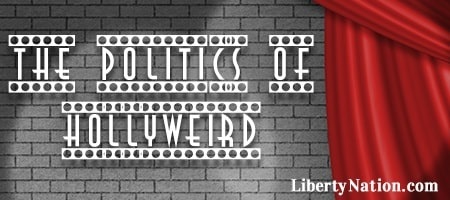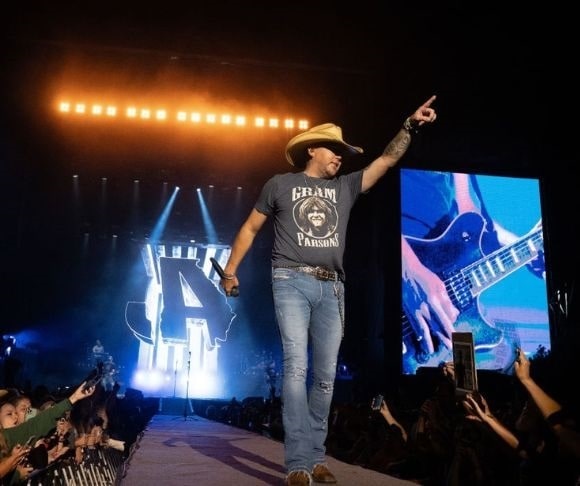Editor’s Note: Whether on screen or off, Hollywood can always be counted on to keep us entertained. This is especially true when it comes to politics. Liberty Nation’s HollyWeird column shines the spotlight on Tinseltown’s A-listers and their wild and wacky takes on today’s events.
On July 17, Country Music Television (CMT) stopped airing Jason Aldean’s “Try That in a Small Town” song and video amid claims that they were racist and “pro-lynching.” Since then, the political divide has deepened as people argue about how residents of small towns won’t put up with big-city shenanigans. This isn’t the first time the music genre has been criticized, so why does the left think country music is evil?
The Video That Sparked Outrage
If you haven’t seen Aldean’s video yet, you can watch it here. Essentially, it illustrates a song about the craziness that happened during the so-called “Summer of Love,” when Black Lives Matter and other groups took control of city blocks in Seattle and Portland, while violent protests happened across the rest of the nation. It reflects on rising crime rates, disrespecting police officers, and efforts to gut our Second Amendment rights – implying those actions wouldn’t be tolerated in a small town. While it’s number one on the charts currently, the video and song are getting bad reviews from the left. Here are just a few:
Rolling Stone: Dr. Karlos K. Hill of the University of Oklahoma said: “It’s the narrative of Make America Great Again, of white nationalism.”
PBS reminded everyone that the video was “filmed at a lynching site,” referring to Maury County Courthouse in Columbia, TN, where in 1927 a mob dragged Henry Choate through the streets behind a car and then hanged him from a second-story window.
Variety Magazine said the problem is “how it conflates the act of protesting with violent crime.” And:
“[I]nstead of being a list of what we like about small towns (water towers, corner stores, holding doors open, lack of stoplights, saying ‘ma’am’), it’s a list of hellishly dystopian tropes about city evils that seems half-borrowed from Hank Williams Jr.’s ‘A Country Boy Can Survive,’ half-borrowed from the Book of Revelation.”
And one more:
“If country music used to pride itself on being about ‘three chords and the truth,’ the increasingly belligerent superstar Jason Aldean has a different idea of what the genre should represent: two chords and a beating, or maybe a shotgun blast.”
NPR said, “Aldean ups the vigilante ante by bridging the second chorus with a reference to gun rights.” The second chorus goes like this:
“Got a gun that my granddad gave me
They say one day they’re gonna round up
Well, that sh– might fly in the city, good luck.”
Joy Behar, co-host of The View, called it “deplorable,” while other reactions ranged from “very divisive” and “controversial” to “shameful.”
Why Is Country Music So Evil?
Aldean’s song isn’t the first attack on country music; that fight has been happening for a long time. Is it because the genre is connected with southerners and the South is linked to slavery? The Observer wrote:
“The South may be associated with the Confederacy, but using that as the sole reason to portray the South as more racist is an oversimplification. Just because slavery was more highly concentrated in the South before the Civil War, due to its agriculture-based economy, does not make the North guiltless. Jim Crow laws began in the North before the Civil War. While New Yorkers may not have had slaves the way Southerners did, the 19th-century New York City economy was heavily dependent on slave labor.”
In 2003, the Dixie Chicks suffered major controversy when singer Natalie Maines introduced their song “Travelin’ Soldier” and bashed the invasion of Iraq and then-President George W. Bush. That freedom-of-speech bit cost them sales and airplay, prompting the group to ditch the “Dixie” and change its name to simply “Chicks.”

Luke Combs (Photo by Terry Wyatt/WireImage)
Country music singer Luke Combs covered Tracey Chapman’s folk song “Fast Car,” bringing it to the top of the charts. However, a popular Washington newspaper article slammed the artist, saying the song is “clouded by the fact that, as a Black queer woman, Chapman, 59, would have almost zero chance of that achievement herself in country music.” Even though she didn’t sing it as a country song, and she gets royalties from Combs’ earnings, the news outlet said he should do more — like “add to the discourse of the urgency of change in country music,” such as inviting “a queer Black female artist to join him on tour or to offer his support.”
CMT is receiving criticism for banning Aldean’s song, comparing it to such other woke companies as Target, Kohl’s, and Anheuser Bush, which is embroiled in the Bud Light scandal. The country music industry itself is under fire for trying to change the genre. Even artists are getting in on the rebukes, such as singer Creed Fisher’s line in his song, “It Damn Sure Ain’t Merle” (as in the great Merle Haggard): “Them record execs, they done lost their damn mind, they think we’re all too old, deaf, dumb and blind.”
Psychology Today had an interesting article by Cody Kommers, “Why Republicans Listen to Country Music and Democrats Don’t,” on the political difference in the types of music people prefer. Referring to social psychologist Jonathan Haidt’s Moral Foundations Theory, “[You] can understand how a group of people thinks about right and wrong by trying to tease apart the moral dimensions on which they base that judgment.” According to the theory:
“[L]iberals judge right and wrong based on two dimensions. He [Haidt] calls these the moral foundations of ‘Harm/Care’ and ‘Fairness/Reciprocity.’ The stereotype of the ‘bleeding heart liberal’ is appropriate here. Liberals care deeply about preventing harm – to the environment, to minorities, to the poor. And they also care about creating a society … that is fair for everyone.”
The article added that conservatives care about these things as well, but:
“[T]hey also bring more than these two dimensions to bear on judging right and wrong. According to Haidt, they consider five dimensions. In addition to the two previous mentioned, they are ‘Ingroup/loyalty,’ ‘Authority/respect,’ and ‘Purity/sanctity.’ To play into their stereotypes, conservatives are more likely to put ‘America first,’ place a higher value on respecting authority, and are more sensitive to acts of ungodliness.”
This is basically what the song “Try That in a Small Town” is about. Why, then, is the left so offended by it? As The Federalist opined:
“In other words, Aldean’s song is an assertion that rural Americans can and will defend themselves if faced with the same leftist political violence and chaos that has been unleashed on the metropolises. For the new woke world order to exist, the left needs the citizenry, and particularly men, to be neutered (hence why they label masculinity ‘toxic’).”
There also has been controversy over country music vs rap and how the latter features much more violence. National Review explained that theory using Aldean’s song as an example:
“Why do left-leaning writers think country is more dangerous than rap or other genres? At bottom, not because they think the music is more dangerous, but because they think rap fans are harmless friends and country fans are menacing cultural enemies, so there is a need to more carefully censor what they listen to. That is why people are defensive about complaints directed at Aldean’s music, and why he’s selling so much of it.”
 Aldean’s video was edited to remove some BLM protest pictures because a report warned they contained coded threats against black people. Social media posters have been enthusiastically saying this is proof the artist did something wrong or posted something he was ashamed of. However, in a statement about the footage, Aldean’s record label, BBR Music Group, said, “[T]he video footage was edited due to third party copyright clearance.”
Aldean’s video was edited to remove some BLM protest pictures because a report warned they contained coded threats against black people. Social media posters have been enthusiastically saying this is proof the artist did something wrong or posted something he was ashamed of. However, in a statement about the footage, Aldean’s record label, BBR Music Group, said, “[T]he video footage was edited due to third party copyright clearance.”
Now, I leave you with one final quote from Variety Magazine and the question: Does this mean we need fewer small towns and less country music?
“Let’s get back the country songs that make small towns sound inviting — even if, honestly, we could use roughly 70% less of them — and that don’t mean to set outsiders of any political or racial stripe on edge about what might be coming at their back on the way out.”
Tune in next time to see what else Tinseltown has planned.




